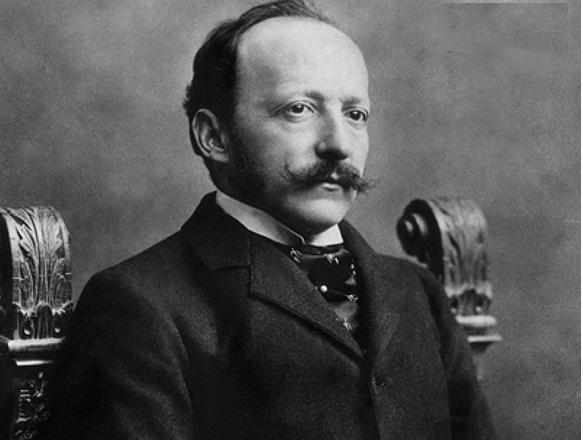César Ritz, ‘the king of hoteliers and the hotelier of kings’

César Ritz died exactly 100 years ago, having created a hotel empire and changed the lexicon of luxury. Not bad for the 13th child of a Swiss mountain farmer.
“If you’re blue and you don’t know where to go to, why don’t you go where fashion sits: puttin’ on the Ritz.” Everyone knows at least the title to Irving Berlin’s 1927 song about dapper and decadent New Yorkers, but few people know much about the man whose name is now defined in dictionaries as “ostentatious luxury”.
In 1850, César Ritz was born in NiederwaldExternal link, a village in canton Valais, on February 23 – which also happens to be the birthday of renowned Swiss chef Anton Mosimann.

As a boy, he looked after his father’s sheep and, after finishing school at the age of 15, he became an apprentice sommelier at a hotel in nearby Brig. It wasn’t a wild success. “You’ll never make it,” the manager said as he let Ritz go. “You need a special flair in the hotel business and – permit me for saying so – you haven’t got it.”
This didn’t discourage the 17-year-old Ritz, who acknowledged he had “lots of ambition but very little money”. He headed to Paris, where he worked as a waiter and ended up at Voisin, the most fashionable restaurant of the day, crammed with celebrities.
He had an excellent memory and made it his business to find out what a guest liked: what food, what wine, what music. The Prince of Wales, later Edward VII, once said: “Ritz, you know better than myself what I like. Just arrange a dinner according to my tastes.”

Ritz later returned to Switzerland to manage the Rigi Kulm Hotel and the Grand Hotel National, both overlooking Lake Lucerne, where his skill and attention to detail were noticed and admired.
‘Customer is always right’
He managed the Swiss hotels in summer and then in winter he would follow Europe’s migratory high society down to the Mediterranean, where he managed hotels in Nice, San Remo and Monte Carlo.
In Monte Carlo he spotted the talent of French chef Auguste Escoffier, now regarded as the father of French cooking, and in 1880 asked him to run the kitchens of the new Grand Hôtel. In 1887, they opened a restaurant together in Baden-Baden in Germany and moved to London for about ten years, where the Ritz-Escoffier team attracted the rich and famous to The Savoy and then to The Carlton.
In 1898, the world’s first truly luxurious hotel – Hôtel Ritz – opened in Place Vendôme in Paris. This was followed by The Ritz Hotel in London in 1905 and The Ritz Hotel in Madrid a year later.
Ritz was the first to say “the customer is always right” (although his words were “never wrong”). His code was: “See all without looking; hear all without listening; be attentive without being servile; anticipate without being presumptuous. If a diner complains about a dish or the wine, immediately remove it and replace it, no questions asked.”
He also spared nothing when it came to food. What’s more, his strategy was to serve what women liked – beautiful, well-dressed women were playing an increasing role in the dining rooms of the great hotels and, until then, aristocratic women were not used to dining in public.
However, despite all this success and adulation, Ritz suffered from depression. His French wife, Marie-Louise, wrote that he would ask her: “What have I achieved? Nothing.” After a nervous breakdown in 1902, he barely worked for the last 15 or so years of his life.
César Ritz died aged 68 on October 26, 1918, in a clinic in Küssnacht am Rigi on the shores of Lake Lucerne – a few weeks before the end of the war that had destroyed much of Europe. He was buried in Paris, but his remains were later returned to Niederwald, where visitors can follow a “life pathExternal link” devoted to the village’s most successful son.
In this archive report from April 2000, former swissinfo.ch journalist Robert Brookes looks back at the secrets of César Ritz’s success, why he had to leave Switzerland to be recognised and how his philosophy lives on today:

More
‘He welcomed guests as though they were family’

In compliance with the JTI standards
More: SWI swissinfo.ch certified by the Journalism Trust Initiative















You can find an overview of ongoing debates with our journalists here . Please join us!
If you want to start a conversation about a topic raised in this article or want to report factual errors, email us at english@swissinfo.ch.